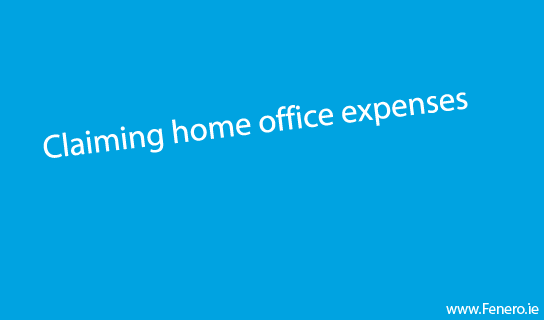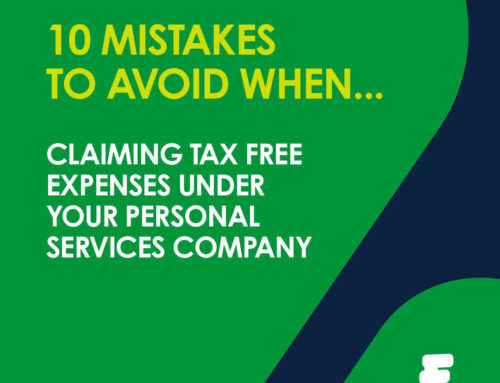Many contractors and freelancers who do not work from a client’s premises, have a home office. What costs related to your home office are tax deductible?
Rent
The portion of any home rent that you claim as a business expense should be proportionate to the size of the home office (square footage) versus the total size of
your home. This figure should not generally change month on month, as the size of the home office will not fluctuate in relation to the size of the house (bar any physical changes you may make to the structure).
There is an alternative to this method of calculation. You may instead claim the additional costs incurred by renting a property of the size you have. By way of
explanation, it could be a fact that a 2 bedroom property would be sufficient for personal purposes. Had you instead rented a 3 bedroom property due to extra space
required for business purposes, it would be acceptable to claim the additional cost of renting a 3 bedroom property over a 2 bedroom property. If you are choosing this
alternative method it would be advisable to retain evidence of rent costs of various properties at the time that you started to let your current property. This could be used
to justify the amount being claimed.
You should be aware that if you rent a 1 bedroom property, Revenue are generally quite unlikely to accept that you can claim any portion of your rent as a business expense. This is because a 1 bedroom property is generally the smallest type of property that you could rent. Revenue’s stance would be that you would have to incur this cost in full as a personal expense anyway, even if you are now also using a dedicated space within the property as a home office. Therefore in Revenue’s opinion there are generally no extra costs over and above unavoidable personal costs being incurred by you due to business reasons.
Another important factor to consider is the actual usage of the home office. The mere existence of a home office in itself would not justify an expense claim. There would
have to be significant business related activity carried out in the home office to satisfy a genuine claim for home office expenses.
Mortgage
If you are a homeowner, we do not recommend that you claim a portion of your mortgage as a home office expense. If your company is reimbursing you for a portion
of your mortgage in return for use of a space within your home, this is treated as a rent payment. You will then be liable to income tax on the rent payment from your
company. The Rent-A-Room tax relief scheme does not apply where rents are received from businesses.
Therefore the tax savings made by claiming the expense from your company are negated by the subsequent rental income tax bill that will follow.
In addition, there may be implications to your Principal Private Residence relief on capital gains tax down the road.
Electricity and gas (light and heat)
Claims for a portion of your home electricity and gas costs are allowable as a home office expense. The amount which may be claimed should represent the additional
cost arising due to being required to work from home. That is, your electricity and gas bills are probably going to be a lot higher if you work full time from home compared to someone who works full time outside of the home.
To claim for electricity and gas costs you must establish a reasonable estimation of what your bills would be if you worked at another location compared to the increased cost of the bills you incur due to working from home. The amount claimed may vary each month if the amount of time you work from home is variable. It is advisable therefore to give due consideration each month to a valid amount to claim. This will ensure that you are not over or under claiming your electricity and gas costs.
Care should be taken when you wish to claim a portion of these bills where you only do some work from home in the evenings or weekends. In this situation it is generally the case that often you would be home anyway and therefore be incurring much of the same electricity and gas costs. It is much harder to establish that you are
incurring extra business related costs where you only work from home at evenings and weekends.
In addition, consideration should be taken where you work from home but there are also other individuals at home most of the time too e.g. a spouse, children or housemate. In this case, the fact that you work from home may only have a marginal effect on increasing the household gas and electricty bills above what they otherwise would be. Therefore you would again have difficulties asserting that you are incurring additional costs for business reasons above those being incurred for non-business reasons anyway.
e-Worker Tax Relief
Revenue have specific provisions in place for individuals who wish to claim for home office related costs under the e-Worker regime. E-Working includes:
- Working from home on a full or part time basis
- Working for substantial periods of time outside of the employer’s premises or outside of your normal place of work
- Logging onto the employer’s computer remotely
- Sending and receiving emails, data or files remotely
- Developing ideas, products and services remotely
For the purposes of this tax relief, the term e-Worker does not apply to an individual who, in the normal course of their employment, brings home some work in the evenings or at weekends.
As e-Workers will usually incur certain expenditure in the performance of their duties from home, such as additional heating and electricity costs, Revenue allows a flat
rate tax free expense claim in the amount of €3.20 per day as an alternative to submitting a claim based on the amounts actually incurred.







